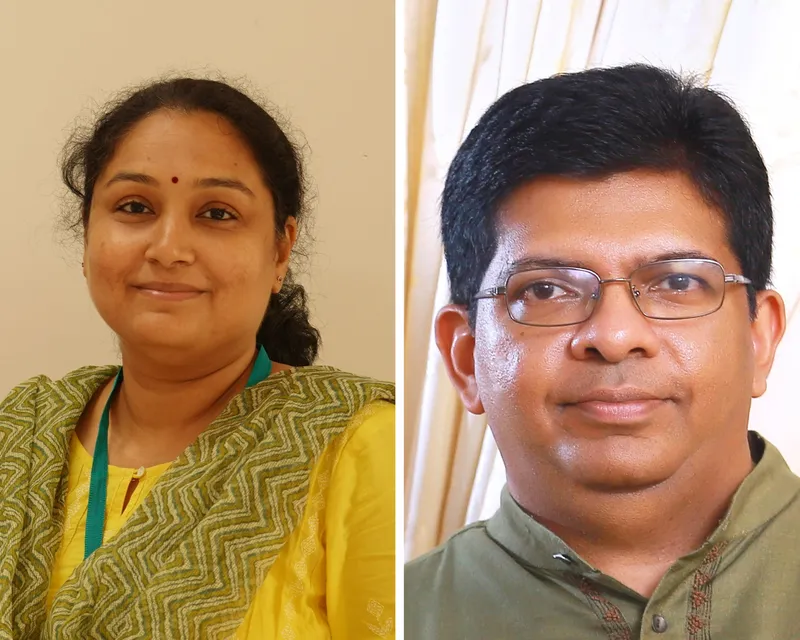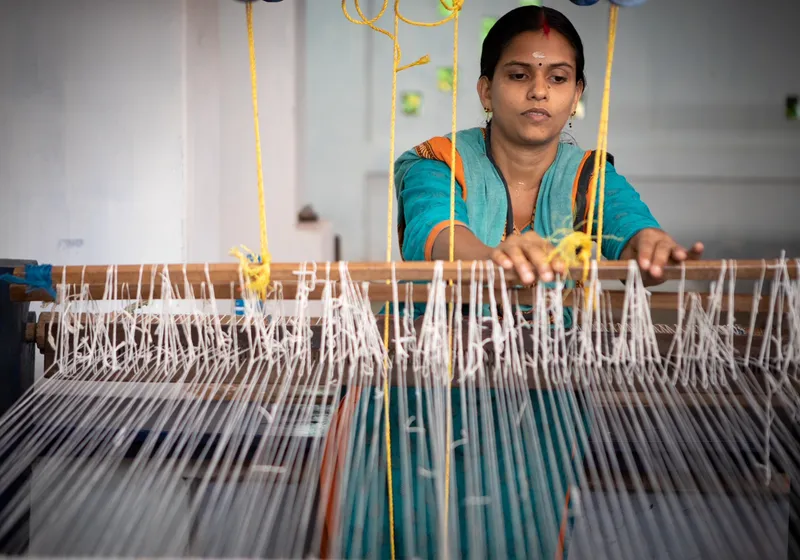Meet the social entrepreneur couple working with women of ethnic communities in Kerala
Rakkee Thimothy co-founded social enterprise Graamyam with her husband, Biju George, in 2020. The couple work with five craft communities in Kerala, and aims to elevate the livelihood of women craftspersons in the region.
In her decade-long career as a labour economist, Rakkee Thimothy often came across workers in the informal sector, and was disheartened to see their employment conditions.
She was especially moved by the stories of craft communities across India, who largely struggled for a livelihood.
“I felt this urge to do something to improve the reach of Indian craft products. I felt if they were available in the global market, it would really change the lives of rural craftspeople,” she says in a chat with HerStory while attending the Kerala Startup Mission’s Women’s Startup Summit held recently in Kochi. HerStory was the media partner for the event.
She recalls how she went on to work at the VV Giri National Labour Institute as a faculty member for seven years, before moving to Singapore to pursue her post-doctoral research at the Singapore Management University.
After a few years in Singapore, Rakkee and her husband Biju, a corporate professional who was a designer at heart, decided to relocate to Kerala.
“We both wanted to utilise our knowledge and experiences from around the world to benefit the local community, and that’s how Graamyam came about,” Rakkee says.
The duo launched Graamyam (meaning ‘from the villages’) in 2020, an ecommerce platform that deals with handmade, eco-friendly, and sustainable products.
Rakkee says they were drawn to the idea out of their love for authentic handcrafted products and a passion to build sustainable livelihoods for artisans.

Rakkee Timothy and Biju George, Founders, Graamyam
Building livelihoods
It is well known that most traditional handicraft communities do not have economically viable livelihoods. The pandemic left them even more bereft of options.
Rakkee says the younger generation of artisans is more unwilling to continue traditional trades, citing reasons like lack of dignity in the profession and availability of other options like gig work.
This is where Graamyam is making a difference.
According to Rakkee, the organisation partners with craft communities in Kerala to introduce new designs and markets, providing them with a better price for products.
“Interventions by Graamyam has helped revive a dying craft, like the Kannadipaya made by tribal communities. We provided them with working capital and training facilities to upgrade their skills,” she says.
Apart from providing a regular marketplace for products, the organisation has also helped communities set up shops to market their products. “We did this in Adimali, Idukki district of Kerala, because we believe quality crafts will only materialise if the craftsperson is motivated to put in their best effort,” she says.
The organisation currently works with five craft communities across Kerala – Kuthampally (textile), Kalavoor (basketry), Chendamangalam (textile), Kilimangala (natural fibres), and Aruvacode, Nilambur (terracotta). The products include handloom (cotton dupattas, stoles, sarees, and home furnishing) and terracotta creations (cook and serve ware).
Graamyam is now diversifying into wood, bamboo and metal craft products, expected to be launched by the end of the year.
When asked about the price range, Rakkee says the products are purposely kept within an affordable range. Prices start from Rs 500 and go up to Rs 4,000.
“We are very keen to ensure the quality of products and make sure chemicals are not added in the production process. As all our products are handmade, and we have attractive discounts for bulk orders,” she says.
Supporting women
The organisation works extensively with handloom weavers and potters, and ethnic communities that are into crafting natural fibres, but makes special effort to ensure women craftpersons continue in the trade.
“In several of the communities we deal with, the master craftperson is a woman. And we take pride in associating with them. All our dupattas are woven by women weavers, and the tassels attached to the dupatta are made and stitched by other woman workers.”
Rakkee says, “The Killimangalam mats are made by a group of women weavers too. The unit was in terrible condition and we facilitated funding for building maintenance. We wanted to ensure a safe and comfortable working environment so that women are motivated to continue work and value what they are doing.”
Rakkee says this is the model they adopt in the case of other communities as well.
Started with an initial investment of Rs 4 lakh, Graamyam now has five regular staff. The artisans get a margin of 10-15% when Graamyam procures all their products after helping design them.
A bumpy entrepreneurial ride

A Graamyam weaver at work
The journey to social entrepreneurship has not been completely smooth for the couple. Coming from a family of employed professionals, making a career shift to start a business was not an easy decision.
“Since Biju had been working abroad for over 20 years, he had to deal with many unknowns, especially regulations and the local business culture. Establishing the right contacts and seeking professional help has helped in this aspect but maintaining an appropriate inventory level is another challenge.
“A year of operations enabled us to develop a production calendar to maintain an optimum inventory level. In addition, we have utilised people management skills to establish a good relationship with craft communities,” Rakkee says.
The couple plans to expand to other southern states later this year, and to craft communities in other parts of India in the coming years.
“We are negotiating agreements with renowned lifestyle chains in the US to improve the reach of our products in global cities,” Rakkee says.
(This story has been updated to correct a typo in the founder’s surname and the meaning of Graamyam)
Edited by Teja Lele







